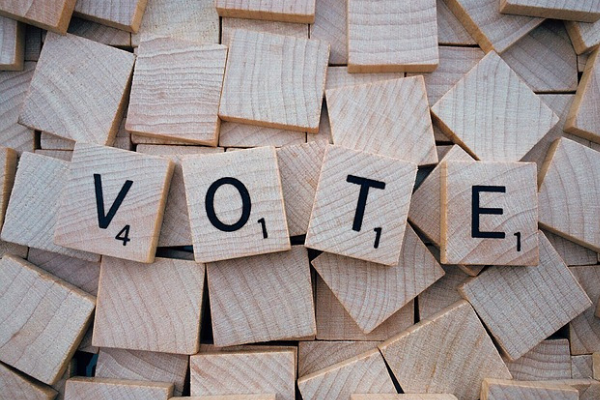So much of the parenting job is right now, in-your-face, last-minute decision making. How to calm a tantruming toddler. On the spot dolling out of consequences for inappropriate behavior. Deciding whether to grant permission for a rated-R movie or questionable party or not. It is emotionally and mentally demanding, and let’s be honest, nonstop.
However, when I have a minute to breathe, I try to remind myself of the long game. I am not raising children. I am raising adults. My goal is not only to get them to adulthood in one piece. The bigger goal is to send them into the world as functioning, productive adults who will make positive contributions to society.
 For our family, one vital responsibility of being a contributing adult is voting. Yet, young people ages 18-29 vote at a much lower rate than other adults. In a non-presidential year like this one, only a third are planning to vote.
For our family, one vital responsibility of being a contributing adult is voting. Yet, young people ages 18-29 vote at a much lower rate than other adults. In a non-presidential year like this one, only a third are planning to vote.
Luckily, parents, we have the ability to mold our children into the voters of the future. Whether you have a tiny tot or a teenager, there are things we can do right now to encourage them to one day wield their power at the ballot, like every responsible citizen should.
Vote and take them with you. First and foremost, we must be good role models. My kids have been to the polls nearly every election since they were born. They went strapped to my chest in a carrier. They went in a stroller. They went when they were old enough to accept candy offered by the little old ladies working the polling station. And they go now, even though they remind me, “We get it, Mom! Voting is not optional. Do we have to go again?” Yes, you do. I want it imprinted permanently on their little brains that voting is just what we do. Every time we have the privilege to vote, we show up.
Watch, read, or listen to reliable news sources. When I was a child, my family watched the news every evening. Not only did we watch it, but often we would spend dinnertime discussing and debating what we heard. I will be the first to admit that I do not watch much television news anymore, but there are tons of other ways to stay informed. We get our news mostly online, via news websites and online newspapers, and just like my parents did, I make a point to share and discuss news with my children. The exchange is even more valuable when it goes both ways. Of course, I send them things to read, but I love it when they send something back. What shows up in their feeds will likely never show up in mine so we both learn more when it’s an exchange and not a one-way way street.
Invite kids to talk about current events and important issues. Listen more than you talk. One of the reasons young adults cite for not voting is their reluctance to form an opinion and fear of being wrong. Even though it is nice to have compliant kids who agree with us, who don’t argue or challenge our opinions, it is less nice to have a society filled with adults who are unable to stand up for their ideas and beliefs. Nothing magically changes when a person turns eighteen or twenty-one. We have to develop these skills in them over time, slowly and intentionally. We do that by asking them about their opinions, by listening to and caring about what they say, and by letting them know they have not just a right but a responsibility to stand up for what they believe.
Help them learn to use the mail. As I read about reasons young people don’t vote, I was shocked at how many were unfamiliar with using snail mail or the post office. After thinking about it, I realized that a lot of my children’s peers have never had to address an envelope, visit the post office to buy stamps, or fill out a form like voter registration. It seems silly, but why let this be an obstacle to voting? Take the time to help them navigate this unfamiliar territory. It will serve them well in other areas of their lives for years to come. So when can teens register? In Ohio, a 17-year-old can register if they will be 18 by the time of the election. Each state is different so find details for all the states here. But you don’t have to wait until they are young adults to teach how to use the mail. Anyone who is old enough to write can send a letter to Grandma. I bet she would be thrilled.
Work on media literacy and critical thinking. Yes, hopefully they are learning this in school, but it can’t hurt to practice at home, too. Ballot issues can be confusing, and who among us isn’t frustrated with the barrage of candidate ads that have conflicting information? Ok, but what if you aren’t feeling confident in your ability in this area? Here are some resources I use:
- This helpful chart shows how reliable and biased common media sources are. Those toward the top and center are trustworthy. As you move out and down, it makes sense to be more skeptical of the news you find there. Encourage kids to seek truth through multiple, reliable sources. Show them how to research both sides of an issue.
- Vote411.org Simply put in your address, and this website provides a list of all the races and issues you will be voting on. It also provides an unbiased look at the candidates by asking them to respond to a series of questions so you easily compare for yourself. Each issue is also available for you to read, along with the common arguments for and against. Reading through this together and talking about the ideas you find there can help kids feel more confident in their ability to understand the issues and form opinions about them.
- iCivics.com has a wealth of information and lessons available to help students of all ages learn how our government works and why it is important for each of us to be engaged citizens.
- Use that mountain of flyers arriving in your mail for a little fun and learning. We compare the claims of opposing candidates, research what they have actually said or voted for in the past, and try to decide who might be the best match for us.
I know everyone is not quite as excited about research, debates, and voting as I am. I fully admit I am a bit of a politics nerd. But I know our system works best when everyone participates. Every vote shapes our society, and the more voices making up those votes, the more it works for everyone. Don’t you want your kids to be a part of that when their time comes? I know I do. Let’s make it happen.
SaveSave













